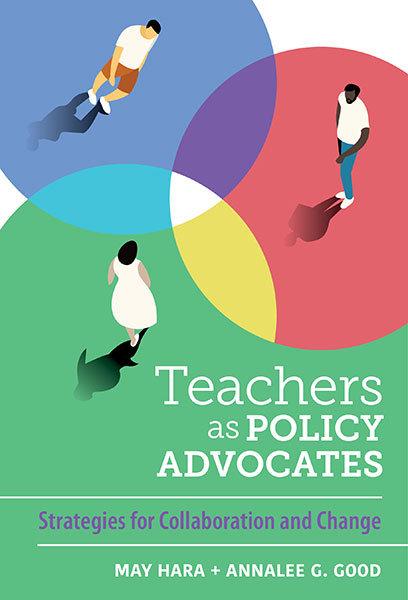
 May Hara is an associate professor at Framingham State University and has taught middle school English and English as a second language in the New York City public school system. Annalee G. Good is an evaluator and researcher at the Wisconsin Center for Education Research at University of Wisconsin–Madison and has taught middle school social studies. They are the authors of Teachers as Policy Advocates: Strategies for Collaboration and Change.
May Hara is an associate professor at Framingham State University and has taught middle school English and English as a second language in the New York City public school system. Annalee G. Good is an evaluator and researcher at the Wisconsin Center for Education Research at University of Wisconsin–Madison and has taught middle school social studies. They are the authors of Teachers as Policy Advocates: Strategies for Collaboration and Change.A recent proposal in the Wisconsin state legislature would allow school employees with a concealed carry license to carry weapons on school property. In addition, the proposed legislation would waive application, renewal, and background check fees for teachers seeking concealed carry permits. Though state and federal law currently bar firearms in schools, this proposed legislation mirrors those championed in other states seeking to expand exceptions as a means to stem the tide of deadly school shootings. Opponents of such proposals (including many teachers) argue that arming school personnel would make school campuses less safe for students and educators, calling for alternative gun policies that expand criminal background checks and red flag laws.
Educators in states like Wisconsin must not only contend with the threat of gun violence in schools, but also with the question of how to respond to gun policy that directly impacts them and their students. School personnel must navigate federal and state gun policies, determine potential implications for their schools, and develop and implement local policies for their schools and classrooms.
These are weighty questions with high stakes. Too often, however, teachers are not at the table when school gun policy is conceptualized, designed, or evaluated. This is to the detriment of good policy. As our own research into teachers and policy suggests, policy that is informed by teacher expertise from its very inception has the potential to be more effective and more just.
Here is what our research, collected in the book Teachers as Policy Advocates, shows about how teachers make sense of school gun policy:
- Teachers are deeply engaged in critical analysis of how issues and problems are framed in school gun policy. Teachers assess the discourse around policy and its design, implementation, and efficacy through their lens as educators.
- Teachers are acutely attuned to the implications of school gun policy and race, particularly for Students of Color, who are already disproportionately negatively impacted by policy relating to school safety and discipline.
- Teachers are profoundly concerned about the impact of policies like the one proposed in Wisconsin on their ability to build the relationships of trust and caring with students that are fundamental to their work.
- Teachers draw a direct line between school safety policies and student and teacher mental health, citing the critical importance of safety and well-being to teaching and learning.
Teachers are also very clear about what they want and need in order to contribute toward better, more just school gun policy. They want to know more and they want to be able to do more to impact policy.
Our research indicates there are actions teachers, school leaders, district and state administrators, teacher educators, researchers, and policymakers can take to support teacher voice when local and state policy is developed. There exist a number of high-leverage strategies to build spaces where teachers feel equipped to engage in policymaking discussions. For example:
- Teacher educators and school and district leaders can partner to develop collaborative mentorship spaces specifically focused on policy between preservice and practicing teachers. Collaborative mentorship is built on the premise that ongoing collaborative reflection around policy can bolster policy engagement for both novice and veteran teachers.
- Teachers can connect with other educators through professional spaces like EdCamps, teacher-driven “unconferences” directed towards community and connection-building that can be tailored directly to topics of school policy.
- Teacher educators, educational researchers, policymakers, and educators who value teacher policy advocacy can build coalitions to join resources, networks, and platforms towards collective action on school policy.
Whether we are talking about gun policies, math curricula, or dress codes, educational policy is more equitable and effective when teachers are at the center of its creation. Teachers must have space to collectively reflect on and learn about policy together, and policymaking spaces must actively engage their voices. School leaders, teacher educators, educational researchers, and policymakers must work as partners to contribute to the conditions that support teacher advocacy around school gun policy and beyond.

Teachers as Policy Advocates
Strategies for Collaboration and Change
May Hara and Annalee G. Good
Photo by Max Fischer
